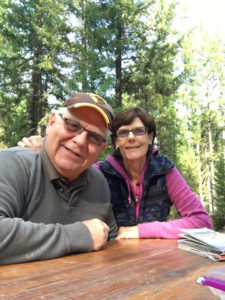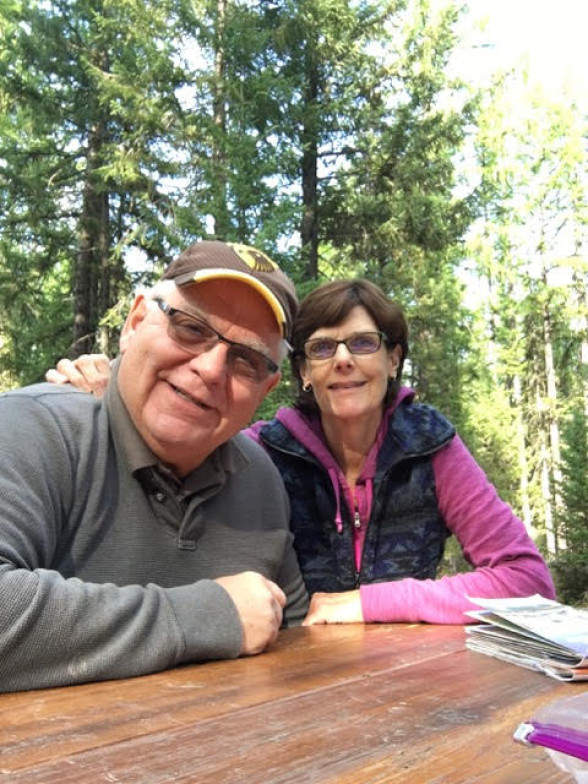 Wally Cox, who is a DAI Board member and peer to per support co-host presented this video presentation at our recent Café Le Brain.
Wally Cox, who is a DAI Board member and peer to per support co-host presented this video presentation at our recent Café Le Brain.
This moving story of love, and his role as a care partner for is wife, and then the transiton from husband and care partner, to himself needing care and support since his own diagnosis of dementia.
"There is no greater agony than bearing an untold story" (Maya Angelou).
This is Wally and Pat's story.
A story of Walls, Connections & Merry-go-rounds.
By Wally Cox
Being a good care partner is not easy. That is a lesson I learned.
Pat and I first started dating when we were teens. Determined to get married, we announced to both sets of parents, “We are getting married next Saturday and we sure would like you to come.” I assured them that I had a job that paid 50 cents an hour over minimum wage, an apartment, $75 in the bank, a brand new water couch in the living room (Hey, it was, after all, the 70’s), and my ’65 VW bus was paid for, free and clear - so there! But imagine, they did not share our excitement. In fact, it was quite the opposite. Undoubtedly it was because we were marrying the day after Pat graduation from high school. But we were in love, did get married, and created a wonderful life together, raising three kids. Things were going great until we were blindsided.
It was 1994 when Pat had first become ill. She needed me. And indeed as a doting husband, I undertook all the mechanical aspects of her care. I took her to the best doctors, I made sure she had nutritious food to eat, I helped with medications to ease her pain, and I researched symptoms at the library. However, my emotional response became embroiled in frustration, fear, and self-preservation. When she needed me to sit with her, hold her hand, look into her eyes and tell her I loved her, I became distant, detached, and unavailable… I had gained so much knowledge with so little wisdom.
Sinking in the midst of my own crisis, I didn’t understand why this disconnect was happening. I reached out to a counselor and learned that I was exhibiting a common behavior. Through counseling, I learned that I was defending myself against loss. I had made this all about me instead of all about us.
You see, I was building a wall, stone by stone, of emotional detachment. I was creating a distance between us that had never been present before.
I was hardening my heart so if Pat did not survive, it would not hurt as much. Heroes run into danger and trouble to help those in need. But in my fear, I chose to turn away. I didn’t leave, but I disconnected, building a wall to shield myself from the heartache that was coming.
So much for being a hero in time of need.
In order to break down this wall, I had to take a risk and become vulnerable. I had to let Pat into the darkness of my pain and thoughts:
- What would I do if she didn’t survive?
- What would become of our family?
- Would I ever find love again?
- And if I did, would that be a betrayal?
- Could she forgive me for my selfish reaction in the midst of her crisis?
Together, and with professional help, we worked out these issues and built an even stronger bond than we had imagined possible. My fears were normal, our love enduring, our connection complete, the wall demolished.
Lesson learned.
It was seven years later that Pat battled her illness once again, this time ending up in the ICU in grave condition. The doctors told me she could not survive and to call our children home to say their goodbyes. While this was a very difficult time in our lives and as hard as that was to hear, I knew this time I did my very best to stay connected to her - heart to heart - through this second bout of her illness. She and I were prepared, as well as anyone could be, to see our journey together through to the end. I was determined to be the best care partner - both physically and emotionally - a husband could be.
Well, God had His plan for us and our future. It was a miracle Pat survived, and it was a miracle that I had become the husband and care partner she needed.
Walls...
Walls - so good at keeping things out, and so good at keeping things in.
I learned so much through this journey about being a care partner. So, imagine my surprise when I found myself building walls yet again, but now I was on the other side of the scenario as a person who needed and still needs care.
It was at work that I first noticed something was amiss. Sometimes, I didn’t recognize clients whom I had seen just the previous day, computer icons didn’t make sense, and I would repeat questions I had just asked. Simple tasks were no longer so simple. Finally, one day a client who was clearly exasperated by my pacing and confusion asked me, “What are you.. stupid??” Wow! That hurt! No, I thought, not stupid, but something definitely was wrong.
I was only 60 years old, I had built a successful insurance practice, and yet tasks that I had previously done practically on autopilot suddenly became almost impossible to complete.
My doctor sent me for a neurological workup, where I was given the diagnosis of Mild Cognitive Impairment with the instructions to go on home and return in one year. Boy, it sure didn’t seem so MILD to me. During that year, I made more and more mistakes at work, I was having trouble with decisions at home, and I started feeling awkward in social situations. Worst of all, I no longer trusted my own judgement.
At my next neurology appointment, I was given the diagnosis of Alzheimer’s Disease. Three generations of dementia: my grandmother, my father, and now me.
I left the job I loved, resigned as a school board member, and quit almost all social functions. After resigning from the school board, I received a call from the local newspaper requesting an interview to discuss the resignation. Instead of taking advantage of this perfect opportunity to speak about Alzheimer’s Disease, I just told the reporter I was ill and I didn’t want to talk about it. When he persisted for more information, I pleaded with him to just leave me alone. Yes, once again I was building my wall.
There I was, isolated by my own choice, hiding from my illness, afraid what others would think. I went into hiding behind my wall… and why?… because of the stigma and fear I felt of having Alzheimer’s.
In the book “Why Many People Abandon Friends and Family with Dementia - and Shouldn’t”, the author states that dementia today is treated like cancer was in the 50’s and 60’s, spoken of in whispers and sometimes kept from its sufferers. You know, like “Aunt Phyllis has the Big C but we are not telling her. Shhhhhhh….. Well now, I had the Big D, Shhhhhhhhh… don’t tell anybody.
Pat recognized what I was doing and helped me knock that wall down. She found the Alzheimer’s Association in Santa Rosa and signed us up for the Early Stage Support Group. I had my doubts about this group. She signed me up for a support group online with DAI, Dementia Alliance International, a forum run by, and for, those of us with dementia. I had my doubts about this as well.
But I was surprised to discover people talking about dementia openly, unashamedly, and without apology. Counselors, care partners, and people who needed care helped me see that my life still had purpose… hope… which I was missing. I learned again to tear down my wall.
Walls… only the first lesson…
And then Pat and I had to move on to the second lesson…
The Merry-Go-Round.
When I was a motorcycle riding safety instructor, one of the most important lessons I taught was, “Look where you want to go.” You see, we naturally veer in the direction we are looking. I would instruct new riders to pick the best path to follow and aim for it. Don’t focus on the things you want to avoid, the tree, the rocks, the potholes. Look in the direction you want to go. The same is true when facing an illness.
When I was diagnosed, our family doctor told my wife and me to go home and “get our affairs in order.” What did that mean to me? How did I respond? Well, at first, all I could focus on were the depths of the diagnosis, losing myself one bit at a time and all that entailed.
It was as if I was on a merry-go-round, standing on the outside edge as it was spinning around, staring resolutely at the center pole where I saw my future - the big D’s - Dementia, Despair, Depression, Disappointment, Death. I found myself not being able to see anything else, whirling in circles, becoming ill from worry, stress and concerns.
Yet, meanwhile, as I focused on the center of the merry-go-round, behind and surrounding me were all the good things that I would have seen if I had just turned around and looked out instead of in. I was looking at the tree, the rock, the pothole - my Alzheimer’s dementia.
I needed to look outward from this merry-go-round, to see another path, the rest of my world — filled with faith, family, friends, music, love, adventures, art. I needed to recognize that I am more than my diagnosis, that I am more than my illness. Yes, there are things I truly cannot do, but there are many things I can. That is the path I have chosen.
Pat and I have started traveling in our RV, seeing new places and making new friends. I started expanding my interest in art, with my sketching and watercolors. I do more of the things I can to help in our daily lives, and Pat does more of the things she must. But it works.
So where are you and your loved one on the merry-go-round? Are you staring inward at what cannot be controlled or outward to what is possible?
So where are you with your emotional walls? Are you building up, or are you tearing down?
Emotional walls - merry-go-rounds- these are two things that do affect how we wake up in the morning; they do affect how we go through our day; they do affect how we relate to other people; and they do affect how we appreciate the things we have.
We need to recognize and work toward building connections, slaying fear and opening our hearts, having a spirit of gratitude. This is a daily choice.
We need to recognize that the merry-go-round of life is always there. But while we are alive, we can still choose to look in or to look out. This is a daily choice.
The choice for Pat and me is to love, live, laugh, and connect. What do you choose?
